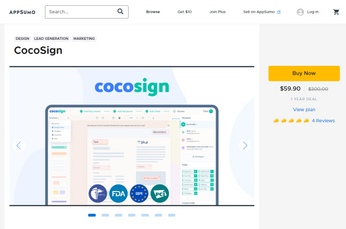
How E-Signatures with Identity Verification Expand Market Reach
As online and digital transactions continue to become more popular, the total number of digital frauds has also increased tremendously. The finance and insurance sectors are especially vulnerable to these threats.
One of the most effective ways to combat such attempts is by implementing robust identity verification measures with e-signature solutions.
Why choose such an approach?
Because the digital signature market is expected to grow at a CAGR of close to 36.4% in the next five years.
Combining e-signatures and ID verification can help businesses attain several objectives, including fraud prevention, compliance, building customer trust, and accessing new markets.
This article will explore the impact and role of e-signatures and ID verification in helping businesses secure different transactions.
The role of e-signatures in modern business
E-signatures have made compliance management easier and more reliable than ever. They validate documents, sign contracts, approve transactions, and manage agreements without the need for physical presence. The usage is not restricted to any particular industry, as businesses of all types and sizes need to comply with several legal considerations.
In a similar way, email signature management helps organizations maintain consistent branding, legal disclaimers, and regulatory compliance across every employee’s outbound communication.
Here are the most critical benefits that make e-signatures indispensable for modern businesses:
- E-signatures are highly efficient as they eliminate the need for physical documents and in-person meetings, speed up transactions, and reduce turnaround time. With the addition of online meetings, the entire process becomes even more streamlined as all stakeholders are on the same page.
- E-signatures are critical in cost-savings for businesses as businesses (especially small businesses) can save significant money by reducing paper use, printing, and mailing costs.
- E-signatures are very convenient as they enable remote signing, making it easier for businesses to operate globally and for clients to sign documents from anywhere.
- These signatures play a critical role in business security measures as encryption and authentication methods ensure the integrity and authenticity of signed documents.
- It is an integral part of businesses' compliance management processes since e-signatures are legally recognized in many countries, meeting regulatory requirements for digital transactions.
- With reduced paper usage, e-signatures help contribute their bit to improve sustainability measures.
- The role of e-signatures is critical in streamlining document management and approval processes, enhancing overall productivity.
Why identity verification matters?
Due to their impersonal nature, online and digital transactions can suffer from identity fraud. ID verification helps ensure the authenticity of a signature claim on a document, thereby preventing fraud and unauthorized access.
Tools like Aura's digital footprint checker can help businesses understand their exposure risk by revealing what sensitive information is already publicly accessible online.
The traditional method of identity verification service involved a long and error-prone process that included manual authentication of records, which meant that the chances of forgery were quite high.
By validating individuals' identities, businesses can comply with regulatory requirements, protect sensitive information, and build customer trust. Since digital transactions were traditionally under scanner due to the lack of human element, this combination enhances the security and integrity of digital transactions.
Here are some of the most critical points underlining its importance:
1. Prevents fraud and unauthorized access
The identity verification process is quite comprehensive and includes multiple layers of authentication, such as biometric scans, government-issued ID checks, and two-factor authentication. Including so many checks automatically gives this process an edge over the traditional methods.
A business can also confirm each participant's identity in transactions. This protects the company from potential financial losses, upholds its reputation in a highly competitive market, and contributes to making a secure and trustworthy environment for digital transactions.
2. Meets regulatory compliance requirements
Having a secure digital landscape is critical for compliance management. Regulations such as the General Data Protection Regulation (GDPR), Anti-Money Laundering (AML) and Know Your Business (KYB) are around to restrict illegal activities and protect the personal data of users in a system.
A well-defined and robust ID verification process can avoid legal repercussions. Additionally, compliance with these standards enhances the company’s credibility and reliability, and hence, the overall trust of the stakeholders in the system continues to increase.
3. Builds trust and confidence among customers
When the customers know that the businesses they are dealing with have a robust infrastructure for confirming identities during transactions. Customers are more confident that their personal information is protected and that they are interacting with a legitimate entity. This mutual trust is critical for building long-term relationships between the business and customers.
4. Enhances data security and privacy
When the business implements enhanced security measures, it not only protects the business from potential financial and reputational damage but also complies with data protection regulations like GDPR.
How combining verified e-signatures with identity verification helps businesses
This combination is critical in providing businesses with a powerful tool for enhancing security, efficiency, and compliance. Every signed document (including PDF) is legally binding on the stakeholders and helps protect against unauthorized access.
Here are some of the most critical points that can help businesses:
1. Breaks down geographic barriers
Any digital business enterprise aims to cover domestic and overseas markets by expanding its operations. However, this expansion can encounter significant roadblocks in the form of legal and documentation-related bottlenecks. With e-signatures and identity verification service combinations, engaging with clients, partners, and suppliers worldwide is possible confidently.
2. Access new demographics and customer segments
Identity verification has traditionally been linked to different sectors, such as BFSI. However, with the globalization of business processes, other sectors have also realized the importance of verification through e-signature for smooth processing. By providing a seamless and secure signing experience, companies can attract customers from diverse backgrounds and regions.
3. Helps expand into highly regulated markets
Special attention must be paid to compliance management for a business looking to expand in highly regulated markets (such as the EU or China). As business transactions' internal control and security are based on a robust system, businesses can confidently enter and operate in markets with strict regulatory frameworks. For instance, handling regulations such as GDPR, HIPAA, and AML directives is possible.
4. Scales operations efficiently and cost-effectively
Through these two processes, the overall time and resources spent on compliance and document verification are reduced considerably. At times, activities such as paperwork, mailing, and in-person meetings are not required since all compliance work is carried out online with a higher degree of reliability.
Conclusion
Adopting secure e-signatures combined with identity verification is essential for modern businesses aiming to grow and expand.
This integration not only enhances security and compliance but also builds customer trust and opens new market opportunities, positioning companies for sustainable success in an increasingly digital world.





